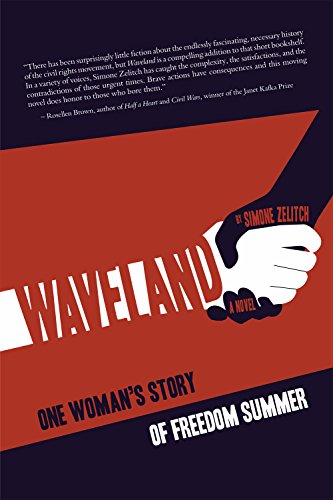Waveland: One Woman’s Story of Freedom Summer
Waveland centers on the recollections of Beth Fine, a white Jewish girl recruited by the Student Non-violent Coordinating Committee (SNCC) in the summer of 1964. Posted to Mississippi, Beth is eager to work the front line, locating black voters and driving them to the courthouse to register. A highly-strung and truly ‘engaged outsider’ who knocks intellectual heads with her black supervisor, Larry, Beth soon becomes disenchanted by the menial tasks of copying, typing, and shelving donated books. She hadn’t anticipated the massive paperwork action campaign. For her it’s about physical action! In Greenwood she meets Ron Beauchamp, a black Mississippian Freedom Rider with whom she has a child in 1965. After the Waveland conference, SNCC moods wavered and shifted, and whites were no longer welcome in the movement.
The content of this novel was mostly unfamiliar to me, but I was quickly swept into an intense and explosive period in history. What felt comfortingly familiar, throughout the narrative, were aspects of life in the ‘60s. Many of Beth’s memories are related through stories told to her daughter, Tamara, who grows up identifying passionately with her black genes. What I found particularly engrossing was the front-and-centre placement of the delicately complex and volatile nature of both the volunteers’ relationships and the movement itself. One might assume that the largely white volunteers (90%), who signed up that summer, thought their contribution would be enthusiastically welcomed – perhaps that their idealism alone would carry the day. But the inevitable shift from a passive, non-violent stance towards the Black Panther ideology is, at least partly, indicative of a movement which became impossible to control. As Larry muses nostalgically – it was easier when we knew everyone and had those midnight meetings. A must-read for ‘60s Civil Rights enthusiasts, and recommended for those who aren’t.










